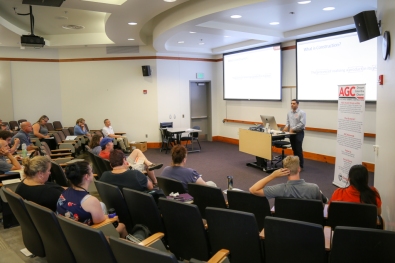Teaching

Joseph brings his unbridled enthusiasm for construction engineering into the classroom to teach various courses at the undergraduate and graduate level. This is rooted in proven engineering educational practices with a fair share of industry input. Joseph also brings innovation to the classroom with the development of various pedagogical innovations such as the AR sandbox and portable VR heavy equipment simulators.
Graduate Classes
CEM550: Simulation for Operations Analysis – This course provides an investigation of quantitative methods used for the design and analysis of construction operations to maximize productivity and minimize resource idleness. Discussions on queuing theory, probability and statistics, and simulation will provide the theoretical basis for modeling actual operations using discrete event simulation (DES), which has been established to be the most appropriate tool for modeling construction operations. Apart from simulation analysis, this course will also provide an introduction to 2D and 3D visualization of operations.
CCE552/IE586: Project Risk Management – This course provides an introduction to the concept of project risk in producing engineered projects. Course content includes project baselining, risk definition and identification, risk assessment and management techniques, risk control, risk response, and risk management. Students will develop a risk management plan, acting as a project manager responsible for scope, cost, and schedule delivery for a project of their choice. Sections of the risk management plan will be created week-by-week through assigned work, and students will peer-review the work of other students.
Undergraduate Classes
CEM441: Heavy Civil Construction Management – This course focuses on methods, production, and costing for heavy civil projects. Given that heavy civil construction relies heavily on the movement and placement of large quantities of soil using heavy equipment, the course focuses on understanding equipment with regard to the type, characteristics, costs, productivity, and planning of equipment needed for a given project. Soil characteristics, quantity analysis, and movement on a construction site are also covered. The course is intended for those interested in the construction engineering and management disciplines.
CEM342: Construction Estimating – II – This is the second of three courses in estimating, cost control, and planning and scheduling. The goal of these courses is to provide a broad, solid foundation upon which students may build their planning, estimating, and scheduling skills.
Innovations for Teaching and Outreach
Augmented Reality Sandbox – Joseph and a group of undergraduate students built an AR sandbox specifically for civil and construction engineering. Current applications include a tangible means of experimenting with and visualizing mass haul diagrams by physically moving sand, and visualizing large transportation network micro-simulations.

Robotics for middle schoolers – In 2015, Joseph participated in the Purdue University’s GK-12 program where he volunteered at the “Gateway to Technology” course as a visiting scholar in the local Tecumseh middle school in Lafayette IN. At the end of this program, he created and delivered an introductory course in robotics for the 8th graders using Arduino and the Processing language. He was awarded the Zimmerman Award for Outreach and Innovation in 2015.
